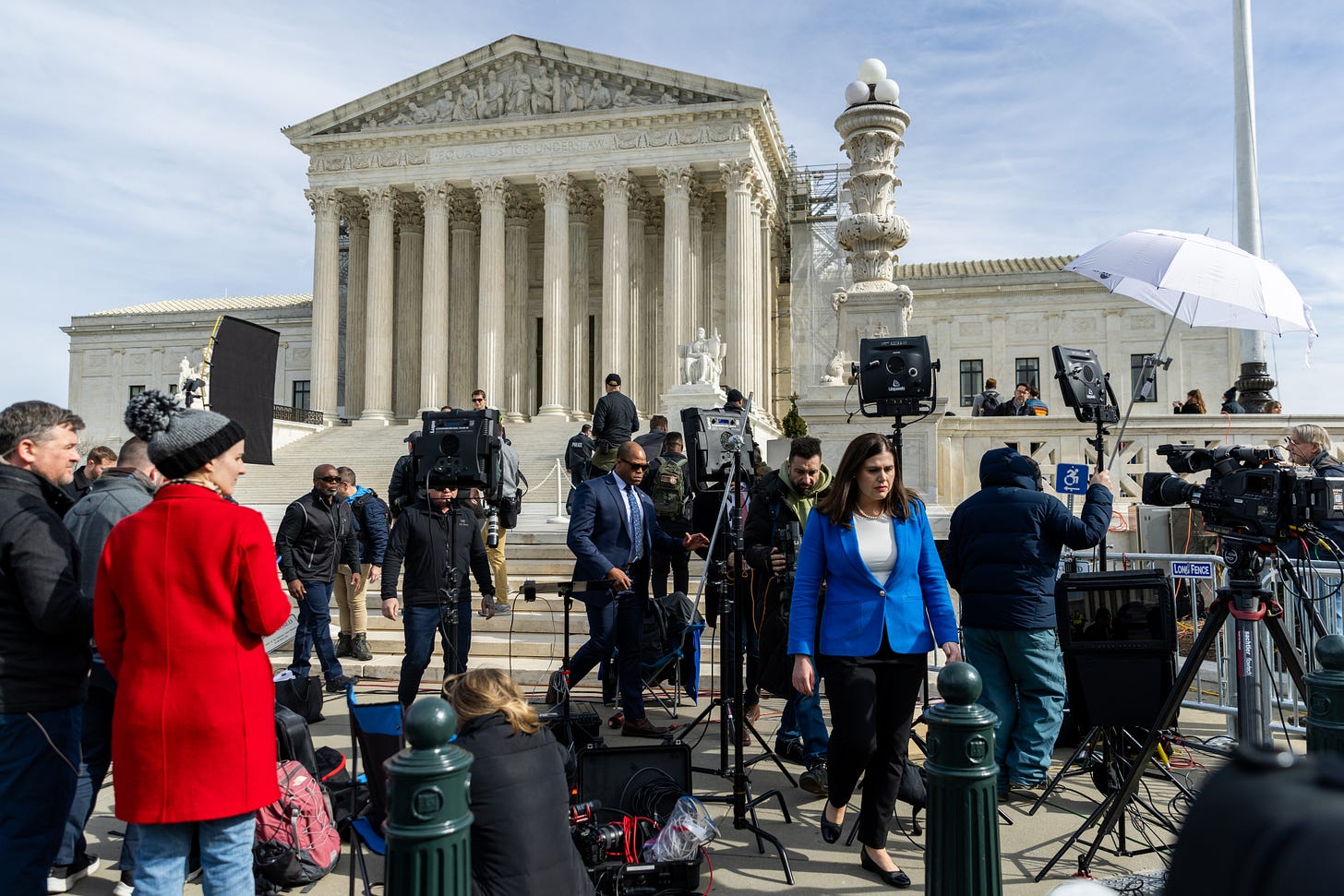SCOTUS Likely to Rule States Can’t Bar Trump from Ballot Under 14th Amendment
The justices were willing to entertain tortured readings of the Disqualification Clause.

BASED ON THE ORAL ARGUMENT before the Supreme Court today in Trump v. Anderson—the appeal of the Colorado Supreme Court’s ruling that Donald Trump is ineligible for that state’s presidential ballot for having engaged in insurrection—there seems to be no doubt that the high court will overturn Colorado’s decision.
The violence and trauma of January 6th, not to mention its potentially dire implications for democracy moving forward, barely even came up during the two-hour hearing. (Justice Ketanji Brown Jackson did ask Trump’s lawyer if January 6th was an insurrection, to which he answered no, it was a mere “riot.”) Meanwhile, Trump is sailing toward the Republican nomination for president, promising to convert the White House into a mechanism for personal political revenge. We should take him at his word.
Instead of focusing on much-anticipated issues like what constitutes an “insurrection” and whether Trump “engaged” in it as spelled out in Section 3 of the Fourteenth Amendment, the oral argument took some unexpected detours. One involved a twist on the question of whether presidents are covered at all. Section 3 bans people who previously were “officer[s]” from subsequently “hold[ing] any office” of the United States if they engaged in insurrection. Prior to today, the distinction between “office” and “officers” seemed one that was mostly without a difference—the main question up for debate was whether only subordinates to presidents could count as officers.
But as Justice Sonia Sotomayor observed, Trump’s lawyers are now conveniently arguing that even if the presidency is an office, the president is not an officer, so—as outlandish as this sounds—when Trump at his inauguration swore an oath to the Constitution, he was not being sworn in as an “officer” and never had been, thus Section 3’s ban on subsequently “hold[ing] any office” simply wouldn’t apply to him. Under this bizarre interpretation, only Donald Trump would have been exempt from Section 3, because every other president since the Fourteenth Amendment was enacted had previously sworn an oath to the Constitution while holding one of the other kinds of jobs listed in Section 31 before they were president. Joe Biden, Barack Obama, and Richard Nixon, to name some recent examples, swore such an oath as senators. George W. Bush, Bill Clinton, Ronald Reagan, and Jimmy Carter swore such an oath as governors. Gerald Ford and George H.W. Bush sworn such an oath when entering the House of Representatives. Donald Trump is the only president in the century and a half since the enactment of the Fourteenth Amendment never to have served his country in government or the military before becoming president, and so, in this interpretation, he alone would be beyond the reach of the Disqualification Clause.
This is completely crazy stuff. Yet, astonishingly, this self-serving argument seemed to gain some traction among the justices. The only silver lining of this interpretation is that it would not entirely eviscerate Section 3. Future insurrectionist candidates for president could still be disqualified, so long as they had previously taken an oath to some office other than the presidency.
JUSTICE BRETT KAVANAUGH OPENED his questioning by noting that the case is not only about the meaning of Section 3’s language, but also about who should decide whether it applies to Trump. By a substantial margin, the justices seemed persuaded that it should not be a state, even though the Constitution gives states the prerogative to decide their own ballot access, election, and voting laws.
If not states, then who? Three options emerged during oral argument.
The most likely option that this Supreme Court will embrace is both chambers of Congress, which can decide to allow lawsuits to enforce Section 3 with brand-new legislation for future insurrectionist candidates. Section 5 of the Fourteenth Amendment allows Congress to pass national legislation implementing Section 3. Congress has only once passed a law to implement Section 3—the First Ku Klux Klan Act of 1870, which established a formal process for disqualifying individuals, and which Congress then undid in the Amnesty Act of 1872. The conservative justices signaled that Congress’s failure to do so again in the intervening years operates as its own kind of precedent against allowing states to invoke Section 3 on their own now.
What’s more, Kavanaugh noted, Congress has passed a statute criminalizing insurrection or rebellion, and that law bans those convicted of that offense from holding office. Special Counsel Jack Smith did not include that statute in the four-count indictment of Trump for his role in the events of January 6th. If he had, things might be in a very different posture now, because if Smith had charged Trump with insurrection and secured a conviction, Section 3 would certainly kick in and Trump would be off the ballot across the country in November. Kavanaugh’s point would therefore seem to hand the weighty question of presidential ballot eligibility for insurrectionists to a second option: Individual prosecutors, who at the federal level are not elected and whose decision to prosecute—or not prosecute—are not subject to any review by a court or by voters at the ballot box.
Justice Samuel Gorsuch’s questioning flagged a third option for ‘who decides’: the House of Representatives. Section 3 specifically states that disqualified candidates cannot “hold any office.” Holding office, suggested Gorsuch, is different from running for office—so perhaps Section 3 can only stop you from being sworn in and holding an office, not from campaigning and getting elected. Under that logic, no state could invoke Section 3 in the run-up to any election (never mind that states have kept folks out of state races numerous times before—including, most recently, a January 6th insurrectionist in New Mexico).
But even more bizarre, what Gorsuch’s argument implies is that the only way Section 3 could operate in the 2024 cycle is if Trump is on the ballot (because states cannot keep him off under Section 3), wins in November, and the House of Representatives, under the nominal leadership of the vice president, then refuses to gavel in the Electoral College votes for him on January 6, 2025. At that point, the theory goes, the question would technically be about holding office rather than running for it, so Section 3 would come alive.
In other words, the Supreme Court may be toying with the notion that the only constitutional way to avoid another January 6th power-grab is for another January 6th to occur—this time with Congress wresting power from an insurrectionist who may have won the requisite 270 Electoral College votes legitimately.
Of course, that maneuver would virtually guarantee even more unprecedented chaos, violence, and civil unrest—precisely the opposite of what Section 3 was intended to accomplish.
Correction (February 9, 2024, 10:00 a.m. EST): As originally published, this article incorrectly attributed to Justice Samuel Alito a line of questioning that primarily was Justice Neil Gorsuch’s, although questions from other justices also touched on the points Gorusch raised.
That is, while serving as “a member of Congress, or as an officer of the United States, or as a member of any State legislature, or as an executive or judicial officer of any State.”





